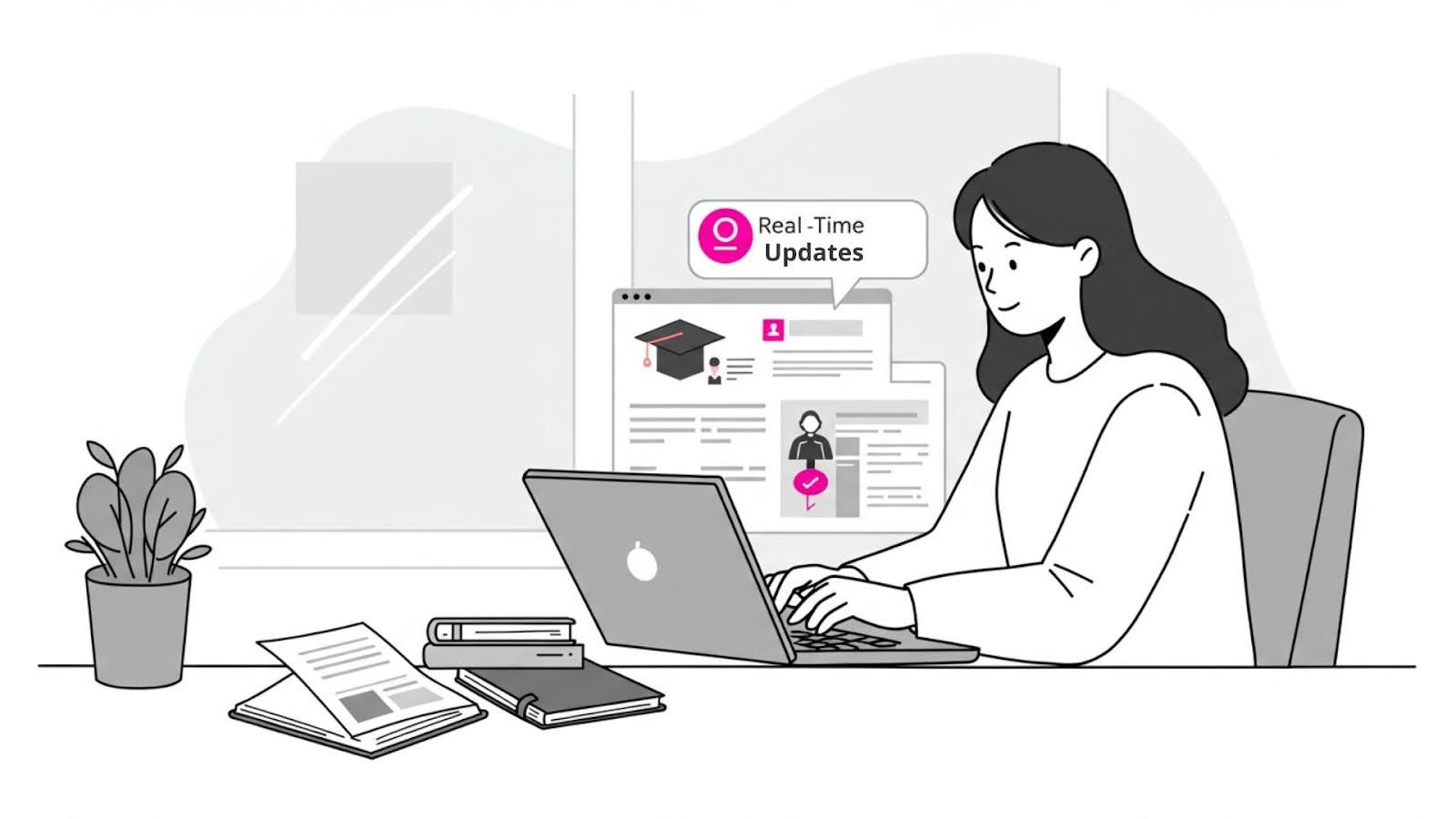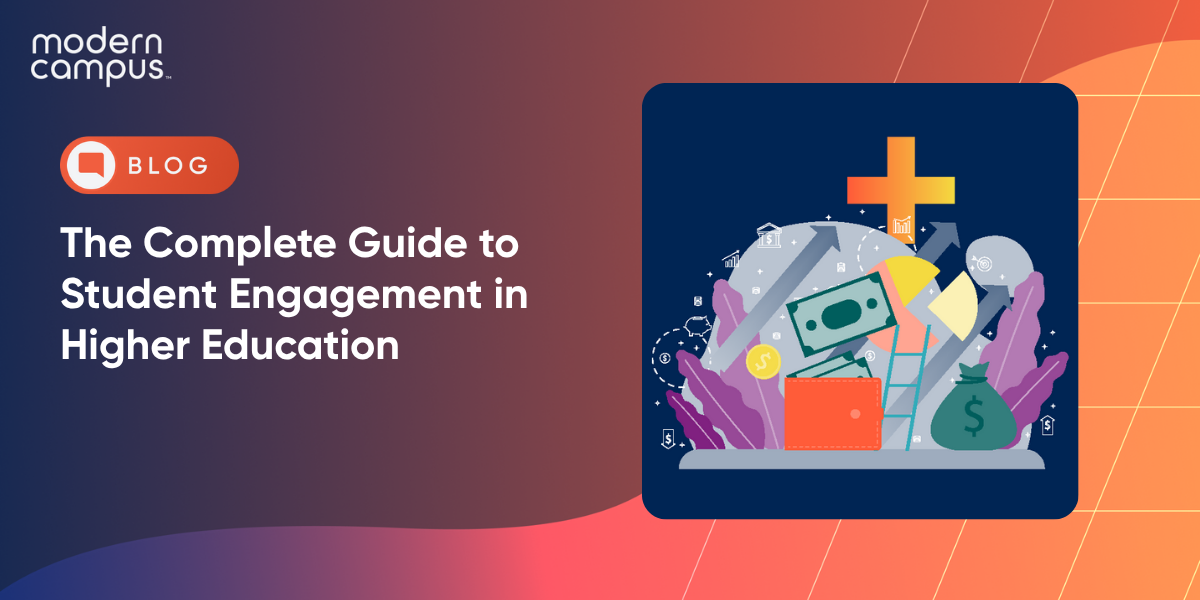The Complete Guide to Student Engagement in Higher Education
Student engagement in higher education is one of the most powerful predictors of academic success, retention and career readiness. Research shows that engaged students are more likely to persist in their studies, utilize campus resources and feel a stronger connection to their institution. This sense of belonging drives positive outcomes—from improved retention rates to better academic performance and workforce readiness.
Institutions must go beyond traditional engagement strategies to meet the needs of modern learners. Personalized learning paths, flexible course options and student engagement software for universities are essential tools in creating an environment where students thrive.
4 Dimensions of Student Engagement in Higher Education
Student engagement is a multifaceted concept that impacts student success. It’s about creating meaningful connections with academics, peers and the broader campus community. Understanding the key dimensions of engagement helps institutions develop effective strategies to support student retention and academic achievement.
Behavioral Engagement: Active Participation in Learning
One dimension is behavioral engagement, which involves students' participation in academic activities such as attending classes, completing assignments and engaging in classroom discussions. Institutions that foster behavioral engagement by offering flexible learning options, interactive course materials and participation opportunities help students remain active in their academic pursuits.
Emotional Engagement: Building a Sense of Belonging
Emotional engagement reflects a student's connection to their school, peers and coursework. When students feel valued and supported, they're more likely to persist through challenges and remain committed to their education. Institutions that focus on building a supportive and inclusive campus culture, offering counseling services and creating meaningful extracurricular activities tend to see higher levels of emotional engagement.
Cognitive Engagement: Encouraging Deep Learning
Cognitive engagement involves students' investment in deep learning and critical thinking. Institutions should provide challenging coursework, encourage inquiry-based learning and offer opportunities for research. At the same time, creative thinking fosters greater cognitive engagement. This dimension helps students develop the skills and knowledge necessary for long-term academic success and future career readiness.
Social Engagement: Strengthening Campus and Peer Connections
Social engagement focuses on students' interactions with their peers, faculty and the broader campus community. Institutions that promote collaboration through group projects, peer mentoring and social learning platforms encourage students to build strong academic and social networks.

A Holistic Approach to Student Engagement
By addressing behavioral, emotional, cognitive and social engagement, institutions can create a supportive and dynamic learning environment. This holistic approach leads to:
- Higher academic achievement
- Increased student retention
- Improved campus involvement
- Stronger career readiness
To maximize the benefits of student engagement and retention in higher education, institutions must combine personalized learning, campus resources and innovative technology to create meaningful student experiences.
Leveraging Technology to Enhance Student Engagement and Retention
Colleges and universities that adopt technology shape the student experience. Personalized learning tools, dynamic communication strategies and flexible course scheduling create an environment where students feel supported, connected and empowered. By leveraging innovative platforms, universities can boost engagement, improve student retention and enhance academic success.
Enhance the Student Experience with Online Learning
Modern universities drive engagement by enhancing college students' experiences through personalized and accessible learning tools. Their students can customize their academic journeys with flexible course options. It also allows for online, hybrid and in-person learning formats that accommodate varying schedules and learning preferences.
One way institutions achieve these goals is by adopting management platforms that work for them. The right software provides real-time updates and automated notifications, ensuring students are always informed about important deadlines, course changes and academic progress. By integrating mobile-friendly interfaces, students can easily access their course materials, track their performance and engage with faculty and peers from anywhere.

These features create a more interactive and supportive learning environment, ultimately increasing student satisfaction, retention and success.
Connect Students with Personalized Communication
Modern educational platforms can also enhance student engagement by personalizing communication, ensuring that students receive relevant and timely information tailored to their individual needs. Automated messaging systems send personalized updates, such as course registration reminders, event invitations and academic progress reports, directly to students via their preferred communication channels.
Whether through email, mobile apps or SMS, students receive messages that align with their academic journey, helping them stay informed and on track. By targeting communication based on a student's specific program, academic standing or interests, the platform fosters a more connected and engaged experience.
A personalized approach to communication ensures students are empowered with the right information at the right time, promoting a deeper sense of involvement in their education.
Personalized Course Scheduling for Improving Student Retention
Institutions can drive student engagement by offering personalized course scheduling options that cater to individual preferences and academic goals. Through comprehensive platforms, students can easily customize their course selections based on their availability, learning style and program requirements.
Flexible scheduling options—including online, hybrid and in-person classes—allow students to create timetables that fit their personal and professional lives. Education becomes much more accessible and manageable. Look for tools that recommend courses based on a student's progress and interests, helping them stay on track for graduation while exploring subjects that align with their goals.
Personalized course scheduling empowers students to take control of their learning experience, resulting in higher satisfaction and retention.
Refined Approach to Launching New Courses and Programs for College Students
To keep students engaged, modern institutions must align their course offerings with student interests and workforce demands. By leveraging data-driven insights, colleges and universities can:
- Analyze student progress and career goals to recommend relevant courses
- Adjust academic programs to reflect industry trends and job market needs
- Ensure courses provide long-term professional value for students
When students see clear connections between their education and future career opportunities, they're more likely to stay engaged, persist through challenges and graduate on time. Adopting a career-focused approach leads to higher satisfaction, increased enrollment and stronger retention rates.
3 Key Benefits of Student Engagement and Retention
When students are actively involved in their learning, they perform better, stay enrolled longer and graduate with the skills employers seek. However, engagement is the result of intentional strategies that connect students to their studies, support networks and career goals.
1. Academic Excellence: The Role of Engagement in Learning Outcomes
Engaged students absorb information more effectively, think critically and perform better academically. Research consistently shows that students who participate in discussions, collaborate on projects and take advantage of academic resources achieve higher GPAs and retention rates than their disengaged peers.
One example of engagement driving academic success is Purdue University’s Learning Communities initiative. This program connects Purdue University students with faculty and peers who share similar academic interests, fostering collaborative learning environments that improve retention and academic performance. Educational institutions that implement similar engagement-driven programs—such as peer tutoring, flipped classrooms and interactive online coursework—see measurable improvements in student achievement.
To enhance academic engagement, universities should leverage student engagement software that offers:
- Personalized learning pathways that adapt to individual strengths and challenges
- AI-driven study tools that provide real-time feedback and recommendations
- Gamified learning experiences that encourage active participation in coursework
Students are more likely to take ownership of their learning when they feel that their education is personalized, interactive and relevant.
2. Retention and Persistence: The Power of Belonging
While engagement influences academic performance, its biggest impact is on student retention. Many students drop out not because of academic difficulty but because of a lack of connection to their institution. Research has found that 24% of college students drop out after their first year, often citing reasons related to isolation, unclear expectations or a lack of support systems.
Schools that intentionally foster engagement and community see dramatic improvements in retention rates. For example, Ohio Wesleyan University introduced an AI-powered engagement platform that tracks student involvement and provides proactive support to those at risk of disengagement. As a result, they increased student retention by providing early interventions based on real-time engagement data.

Colleges and universities can enhance student retention by:
- Implementing early warning systems that identify students at risk of disengagement
- Expanding mentorship programs that connect students with faculty, alumni or upperclassmen
- Creating hybrid engagement models that support both online and in-person learners
A student who feels seen, supported and encouraged is more likely to stay enrolled, overcome challenges and graduate on time.
3. Career Readiness: Bridging Education and Employment
When 53% of prospective students question whether college is worth the investment, institutions must ensure that engagement translates into workforce readiness. Employers seek graduates who are adaptable, collaborative and equipped with real-world experience.
One institution successfully addressing this challenge is Georgia State University, which integrates career pathways into academic advising. Their students receive personalized career roadmaps that link their coursework to industry demand, leading to higher job placement rates and increased post-graduation success.
To make engagement career-focused, institutions should:
- Embed career development into the curriculum through hands-on projects and internships
- Leverage real-time labor market data to align academic programs with in-demand skills
- Offer digital credentialing and micro-certifications that help students showcase their expertise
When engagement is linked to career outcomes, students feel a greater sense of purpose and motivation in their studies. This leads to higher graduation rates and long-term success.
The Engagement Advantage: Building a Foundation for Lifelong Learning
Engagement is a lifelong advantage. Graduates who were highly engaged in college are more likely to remain connected to their alma mater, contribute as alumni and pursue continuous learning opportunities. Institutions that prioritize student engagement also foster a strong, engaged alumni network that enhances their reputation and impact.
By investing in personalized learning, retention initiatives and career-aligned education, colleges and universities can ensure that students succeed both inside and outside the classroom. The result? Confident graduates who are ready to take on the world.
Early Interventions in Student Engagement
Identifying at-risk students early can make all the difference in improving student retention rates and overall success. Many students struggle due to financial aid concerns, family responsibilities or academic difficulties—but proactive engagement strategies can prevent them from falling behind.
Higher education administrators should implement data-driven early intervention systems that monitor student engagement, attendance patterns and academic performance. When warning signs of struggling students emerge—such as missed deadlines, declining grades or reduced participation—institutions can act quickly by providing targeted support.
One example of early intervention in action is learning communities, where students are grouped into smaller cohorts that foster a strong sense of belonging and provide academic and peer support. Additionally, academic advisors can guide students through challenges, ensuring they stay on track toward graduation rates and long-term success.
By leveraging predictive analytics, personalized outreach and structured support systems, institutions can retain students, improve academic achievement and help learners build confidence in their educational journey.
Empowering Student Success Through Engagement and Innovation
Student engagement is the foundation of academic achievement, student retention and career readiness. Institutions that prioritize engagement through personalized learning, proactive support and technology-driven solutions create an environment where students thrive.
By leveraging flexible course options, data-driven retention strategies and career-aligned learning experiences, colleges and universities can enhance student engagement and retention. Early interventions, academic advisors and student engagement software for universities ensure that learners receive the support they need when they need it.
At Modern Campus, we specialize in transforming the student experience through engagement-focused technology. Our personalized communication platforms, dynamic course scheduling tools and AI-driven student engagement solutions empower institutions to connect with students in meaningful ways. With our expertise in helping colleges and universities retain students and improve academic success, we provide the right tools to support students at every stage of their journey. Request a demo today to see how we can help your institution foster engagement, boost retention and prepare students for lifelong success.
Last updated: July 3, 2025

